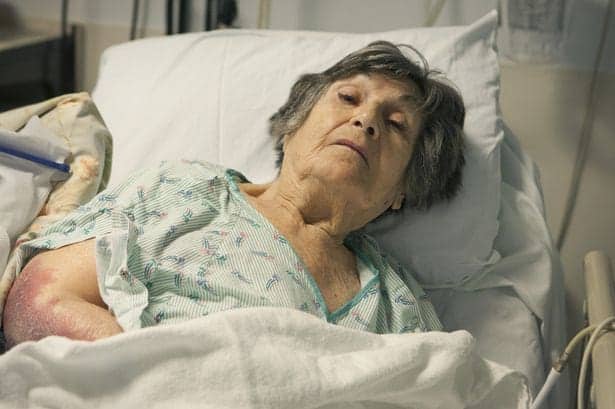(This article originally appeared on The Times of Israel.)
On a recent ER visit with a client, a doctor on staff quietly reminded our Care Manager:
Never, ever leave a senior alone in a hospital.
Yes, we know.
In an ideal world, there would be a dedicated geriatrician or primary care doctor overseeing our parents’ care in the hospital, and a head nurse coordinating the entire hospital team to make sure that everyone is on the same page.
But in the real world — one that is replete with stress, pressure, broken systems and too few resources in which to accomplish and attend to too much – health care staff find themselves constantly needing to “triage” their time, ultimately resulting in less attention for patients who don’t demand it.
The problem is that it can be hard for hospital patients to advocate for themselves, particularly if they are very old or frail. It may be hard for them to think or communicate clearly. Or, feeling vulnerable, they may feel scared or embarrassed to ask questions, or to demand to be heard.
The reality is that it falls on you — the family — to ensure your loved one is getting the right care (and, sometimes, to act as a buffer between an overworked, underpaid staff and the patient). That means being by your loved one’s hospital bed at all times.
If you’re in the hospital, you’re at risk.
The stories are frightening: dying from hospital-acquired infections, elderly patients being given the wrong medication or the wrong combination of medications, having the wrong body part operated on (or removed!) Yes, this actually happens.
As Atul Gawande states in his book The Checklist Manifesto, modern medicine has “become so incredibly complicated that mistakes of one kind or another are virtually inevitable: it’s just too easy for an otherwise competent doctor to miss a step, or forget to ask a key question or, in the stress and pressure of the moment, to fail to plan properly for every eventuality.”
The older you are, the worse it is. Why? Because unfortunately the unique needs of older patients are not really a priority for hospitals. Hospital staff, focused on treating injury or acute illness, tend to overlook nearly all other aspects of caring for older patients: proper nutrition, getting out of bed enough, repositioning consistently and properly, controlling pain, facilitating uninterrupted sleep and differentiating hospital delirium from dementia.
To be sure, hospitals and healthcare systems are investing significant effort to prevent medical error and hospital-acquired infection and to improve patient care. But, in the words of the U.S. Center for Disease Control, “there is much more work to be done.”
You CAN make a difference (and you might even save a life!)
Your presence as an advocate for questions, clarifications and making sure the correct procedure is followed and treatment is given can be critical to your loved one’s recovery.
Be aware.
Be active.
Be engaged.
Here are the steps you can take to maximize recovery and safety:
- Falls are a leading cause of hospital injuries. Make sure the staff are aware when a patient is at risk of falling, and have the patient evaluated if you are concerned. But don’t let fall risk be an excuse for staying in bed! It’s easier for hospital staff when an elderly patient stays in bed, but the impact of staying sedentary can be devastating for older patients.
- Although it feels awkward, ask health-care providers if they have washed their hands, or ask them to do it again. A significant number of hospital-acquired infections can be prevented just by washing hands! Bring a pack of antibacterial wipes and wipe down bedrails, the call button, remote control, phone and doorknobs.
- Don’t be afraid to ask questions and insist on understanding the answers. You need to be able to help your loved one understand and process why a proposed treatment or medication is necessary, and internalize the benefits and risks of potential procedures and treatments.
- Check medication and IV bag labeling before their use to reconfirm the identity of the intended recipient. (Remember, though, not to talk to the nurse while he or she is administering medication.) Ask doctors and hospital staff to explain what each medication is, and why it is being given. Medication should be in the original packaging (yes, check!)
- Prevent surgical or treatment errors by confirming the location and type of surgery with the physician (make sure the surgery site is marked!) Ensure that all blood samples and specimens are labeled in front of you. Ask about whether the patient has been given antibiotics before surgery to avoid infection. If not, then what is the reasoning? Make sure the patient has a warm blanket before and after surgery, since staying warm also reduces infection risk.
- Check that you receive results from all tests (and that they are the right person’s results!)
- Be aware of changes in your loved one’s condition and bringing it to the prompt attention of medical staff.
- Recognize that hospital nurses are handling more patients than they should be. Take responsibility for noticing if your loved one’s condition has changed, if they are uncomfortable, in pain or need help.
The critical piece here is presence, awareness, and advocacy.
Equally important: take care of YOU! To effectively support a parent in the hospital, you need to take care of your own needs first. Don’t be afraid to bring in other family members, friends or professionals for help and support!


Recent Comments